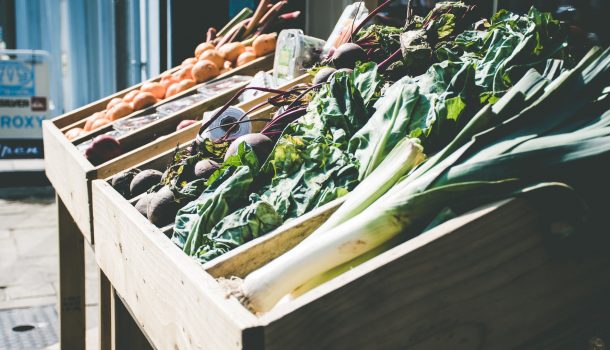The Wisconsin Department of Agriculture, Trade and Consumer Protection (DATCP) announced that eight organizations will receive grants through the Wisconsin Farm to School Program Grant Program. A total of $250,000 will be awarded.

“The Farm to School program gets more locally grown food into our schools and it helps strengthen ties within local communities…”
-DATCP Secretary Randy Romanski
These grants were awarded through a competitive review process, with amounts ranging from $10,000 to $40,000. This one-time funding, provided by the USDA Food and Nutrition Service’s (USDA-FNS) Patrick Leahy Farm to School Grant Program, will be used to improve access to local foods in eligible schools through comprehensive farm to school programming, including local procurement and agricultural education efforts.
“The Farm to School program gets more locally grown food into our schools and it helps strengthen ties within local communities,” said DATCP Secretary Randy Romanski. “With these one-time grant funds, the awarded organizations can foster new partnerships and implement procurement efforts that will last far beyond the grant cycle.”
The goal of the Wisconsin Farm to School Grant Program is to enable communities to develop farm to school partnerships, implement farm to school initiatives, and strengthen Wisconsin’s statewide farm to school network. Piloted for one year, projects will gather impact and outcome data, measure demand for this grant program, and capture success stories to leverage ongoing support and for a permanently funded grant program.
DATCP received 31 funding requests totaling more than $685,000 dollars. The eight grant recipients are:
Hayward Community School District
The Northern Waters Environmental School (NWES): Digging into Local Food Systems project in Hayward will instruct students through field (on-farm) and lab (school). Students will learn about ecosystem nutrient cycling and the critical importance of living soil to produce nutrient dense food. Pastured raised meats from farms participating in soil analysis will be procured and served to students.
Kids Forward
Comida Buena; Supporting Spanish Speaking and Tribal Early Childhood Education (ECE) Providers’ Access to Culturally Relevant Local Foods’ project goals are to increase understanding of and access to fresh, local, culturally relevant, Wisconsin-grown foods. The project also aims to maintain and expand statewide farm to early care coordination to increase equitable access to the benefits of farm to school by supporting the piloting and expansion of farm to ECE community teams in ECE sites across Milwaukee and the Tribal Nations.
Mad Local Food Group, LLC (Pasture and Plenty)
Through two four-week afterschool classes, the Youth Black Excellence Life Readiness Cooking Class & Local Meal Kit Program (Youth BE Program) will provide meal kits containing locally sourced ingredients that highlight Wisconsin’s harvest seasons, allowing students to explore, connect, learn, and create food culture. Each week, participants will join a virtual class led by diverse instructors in the Madison food community. Classes include a kitchen science lesson and virtual field trip that introduces students to places and careers in local food systems.
Nourish Farms, Inc.
The Expanding Farm to School Learning in Sheboygan County project will increase food literacy for 600 additional students in three public school districts: Sheboygan Falls, Sheboygan, and Plymouth. Grant funds will grow capacity at Nourish Farms, Inc. to host additional field trips and deliver lessons to 22 more classes; increase equitable access to field trips and programs for three area low-income schools; repair garden infrastructure at partner schools; and deepen school stakeholder engagement.
School District of Eleva-Strum
The Eleva-Strum Sow & Grow Education Project will expand and improve garden space with additional planting areas, a greenhouse, and hydroponic tower to enrich the educational experiences of students. Enhancement of the existing curriculum will provide an interactive environment and foster community involvement. Harvested, fresh produce will be implemented into school meals, the weekend meal program, and be provided to the local community. By expanding the school garden, the project will plant the seeds for a more sustainable future and nurture the growth and development of students in lasting ways.
School District of Mauston
The School District of Mauston Farm to School Project is designed to increase student and family access to local foods, expand student-grown produce, and increase procurement of local foods used in school meals and culinary classes. Farm visits, farm to school-based activities for staff and students, and newsletters to engage district families and the community will create strong connections between Wisconsin farmers and those who eat the food they grow.
Wisconsin Early Childhood Association, Inc.
The Farm to ECE: Racine County Edible Gardens project will increase the capacity to procure, prepare, and serve local foods in 10 regulated underserved childcare programs in Racine County. This will be achieved through installing edible gardens, providing technical assistance, and improving local foods infrastructure. Agricultural education and resources will also be made available to all regulated childcare programs in the county.
Wisconsin Food Hub Cooperative
Building Farm to School and ECE Networks and Procurement Systems in Waupaca County will build the collaborative network of farm to school and early childhood programs on a local level. The work will support nutrition and know-your-farmer education programming; help food service staff develop recipes and menus; build logistics, pricing models, and templates which support production costs for farmers; help with the cost of aggregation and distribution; and fit within the parameters of school and early childhood provider budgets.


